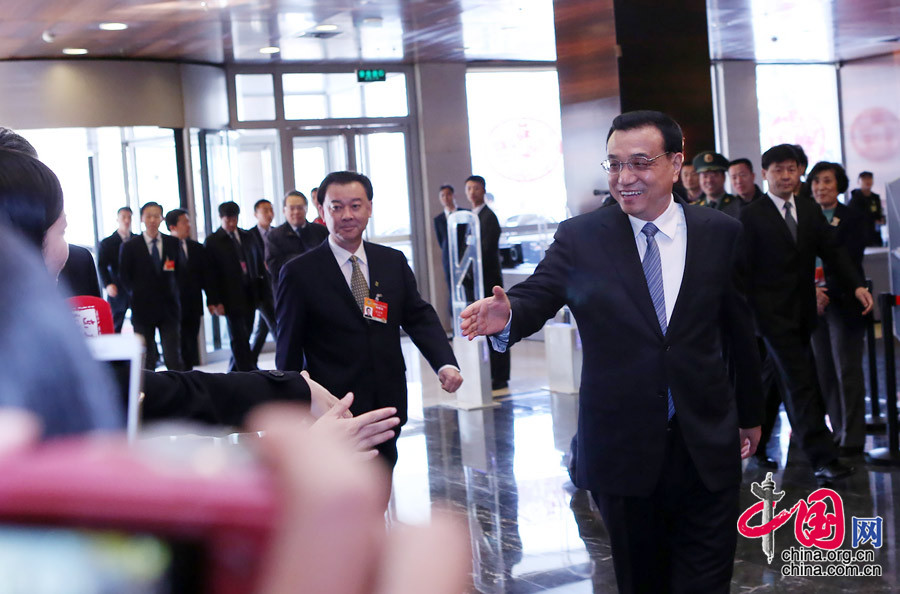Chinese Premier Li Keqiang and other senior leaders on Saturday joined political advisors in their panel discussions concerning the nation’s economic and social development.
 |
|
Chinese Premier Li Keqiang goes to join political advisors in their panel discussions on Saturday. [Photo by China.org.cn]
|
Meeting with advisors from economic and agricultural sectors during the the ongoing session of the 12th National Committee of the Chinese People’s Political Consultative Conference (CPPCC), the premier highlighted the main theme of “seeking progress while maintaining stability” in economic work.
He stressed the need to keep the continuity and stability of the macro-policy with the supply-side structural reform as the focus.
Under the strong leadership of the Communist Party of China (CPC) Central Committee with Comrade Xi Jinping as the core, China witnessed a good start for its 13th Five-Year Plan (2016-2020), said Li.
Despite economic woes at home and abroad, stabilization and improvement were seen in both social and economic areas, he said, citing progress in employment, structural adjustment, new growth impetus and improvement in people’s livelihood.
Li pledged to consolidate the trend of economic stabilization and improvement by comprehensively deepening reform.
Zhang Dejiang, chairman of the Standing Committee of the National People’s Congress, joined in a panel discussion of political advisors from Hong Kong and Macao special administrative regions.
Zhang said Hong Kong and Macao maintained overall stability over the past year, witnessing new and positive development.
Zhang said the central government attaches great importance to elections to be held this year respectively in Hong Kong and Macao, which concern the regions’ prosperity and stability.
Zhang hoped the election in Hong Kong will be held orderly and in accordance with the law.
A chief executive who loves the motherland and Hong Kong, who is trusted by the central government and supported by Hong Kong people, and who is able to govern Hong Kong effectively, should be elected, Zhang said.
Yu Zhengsheng, chairman of the CPPCC National Committee, joined political advisors from the circles of social sciences as well as press and publication in a panel discussion.
Yu called for promoting the development of philosophy and social sciences, and media and publicity work, in order to fuel China’s drive to build a well-off society and realize its great national rejuvenation with “huge positive energy.”
In the process, Yu said, Xi’s instructions and new ideas, thoughts and strategies on state governance should be implemented.
He also stressed upholding the correct political direction, guidance of public opinion and values, and continuing efforts to boost the development of socialist core values.
Liu Yunshan, a member of the Standing Committee of the Political Bureau of the CPC Central Committee, joined political advisors from the literary and art circles in a panel discussion.
Liu said confidence in the country’s culture is an important issue concerning the independence of ethos, and a significant pillar of confidence in the country’s path, theory and system.
Liu attributed cultural confidence to the strong leadership of the CPC Central Committee with Xi as the core, the highly effective political system, as well as shared ideals and aspirations that unite all Chinese.
The CPC Central Committee with Xi as the core has opened a new era for state governance, Wang Qishan, head of the CPC Central Commission for Discipline Inspection, said at a panel discussion of political advisors from the Communist Youth League of China, the All-China Youth Federation, the All-China Federation of Trade Unions and the All-China Women’s Federation.
The CPC’s leadership is the essence of socialism with Chinese characteristics, Wang said.
Wang added that organizations under the CPC’s leadership should unite people around the CPC and consolidate the political basis for the Party’s governance.
Meeting with advisors from the China Zhi Gong Party, the All-China Federation of Returned Overseas Chinese and the group for friendship with foreign countries, Vice Premier Zhang Gaoli called for joint efforts from Chinese people both at home and abroad for the great rejuvenation of the Chinese nation.
Zhang asked the CPPCC members to step up friendly exchanges with foreign countries.
He asked them to help explain China’s stories and solutions, and introduce to the world the China-proposed Belt and Road Initiative to contribute to the shared future for mankind.
![The 3D images of the restoration of the two Xuchang Man skulls [Photo: Xinhua]<br><br><br>](http://images.china.cn/download/site1007/20170305/d02788e9b71e1a25aca804.jpeg)
